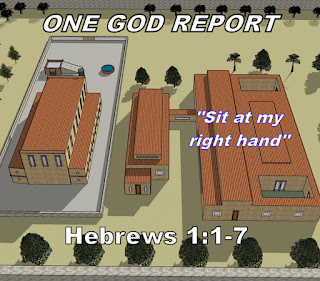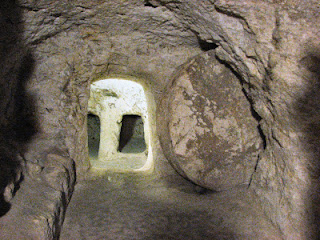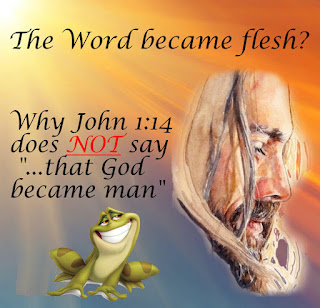Hebrews 1, Is Jesus God? Is Jesus the Creator?
To hear the full podcast episode for these notes, click here.
1. The overall point that
the author is making in Hebrews chapter 1 is not that Jesus is God, but rather that
God has appointed the human being Jesus, as the representative of humanity, to
be God’s vice-regent ruler, to “sit at God’s right hand.” This privilege was
not granted to an angel or angels. This theme, that God has granted a human
being to be at His right hand, fits the overall theme of the book of Hebrews that
Messiah, Jesus, is greater than Moses, is a better high priest than Aaron, gives
a better rest than Joshua, brings into effect and mediates a better covenant
with a better sacrifice compared to what Israel experienced through the earlier
covenant.
If the author of Hebrews thought that Jesus
was God, there would be no reason to make the point that Jesus is greater than
angels, Moses, Aaron or Joshua. Further, a human being exalted to God’s right hand is an overall
biblical theme.
2.
There are some translation issues in
Hebrews 1 that make it sound like Jesus was some kind of co-creator of the
material world in Genesis. We look at these issues in the text, and discover
that the author never calls Jesus the creator of the universe.
3.
In Hebrews 1:1 we note that
“God” is differentiated from the Son of God, Jesus the Messiah. Jesus the Son
of God is not included in the author’s understanding of who “God” is. In other
words, God is not a son, but God has a son, and the Son of God is a human
being. Neither is God ever a trinity to the author of Hebrews.
4.
Hebrews 1:1-2, states that
while God spoke previously by the prophets “in these last times He has spoken
to us by a son”. Hebrews 9:26-28 declares that Christ (Jesus, the Son of God)
has appeared only once so far, but will appear a second
time. The author of Hebrews did not believe in any so-called “pre-incarnate”
appearances of the Christ, the Son of God.
5.
Hebrews 1:2, the son was
“appointed heir of all things”. God is not appointed heir of anything, which
would mean that God has a superior. Biblically, God appoints humans as His
heirs to rule over the earth.
6.
Hebrews 1:2, “through whom
He made the ages”. We note the translation issues with two words in this
verse. For instance, the ESV has “through whom he created the world”
which makes it sound like somehow Jesus was involved in the Genesis creation.
But the word translated “world” (NIV and
NLT translations have “universe”!) is a Greek plural word, aeons,
meaning “ages”.
We note that it is through Jesus Christ,
the Son of God, that God made/makes the ages, both this age and
the age/s to come. In a parallel way, God brought about different ages
through other individual human beings, Adam, Noah and Abraham.
Jesus (as son) is not the maker of these ages, but
God makes the ages through Jesus the Son of God.
7. Hebrew 1:3, the son reflects
the glory (of God), which means that Jesus is not God himself, not the origin
of glory. The glory is not innately the Son's, but the Son reflects the glory of God. Also, Jesus, like a clay seal impression, is the exact imprint of the
character of God. The clay seal is a different material substance than the seal
itself.
8.
Hebrews 1:3, “bearing all
by his word of power”. We note again the
biased translations which make it sound like Jesus is somehow holding together
or sustaining the atoms of the universe, e.g., ESV and RSV, “upholding the
universe by his word of power”. The Greek verb translated “upholding,
sustaining” has a wide range of understandings, including “bear up, carry,
bring, endure, produce”. And the word translated “universe” is simply the word
“all”, which can have a variety of meanings, not necessarily meaning “all the
universe”. We note the parallels in passages like Colossians 1:15-18, Ephesians
1:19-23, 2 Peter 3:22 which state that the once dead, now resurrected Jesus has
been made the head over all authorities and powers. Jesus,
granted by God, bears or carries all authority.
9.
Hebrews 1:3, after Jesus
had made purification for sins, through his death, he sat down at the right
hand of the Majesty on High. In at least two ways this verse says that Jesus is
not God. 1) Jesus died. God does not die. 2) Jesus was promoted to the right
hand of God (the Majesty on High). Again, Jesus is not included in the author’s
understanding of “God”, but rather is at the right hand of God
(cf. Hebrews 8:1).
10.
Hebrews 1:4, Jesus “became much
superior to angels” and “inherited a name”. God is/was never lower than angels,
neither does God inherit a name from someone else. The point the author is
making is that the human being, Jesus of Nazareth, the Messiah Son of God, is
greater than angels. There would be no reason to make the point that Jesus is
greater than angels if Jesus is God. But the author is telling us that Jesus is
greater than angels because: 1) the Torah was mediated by angels and brought
serious consequences for infraction. How much more so this covenant ratified by
Jesus who has been made greater than angels. 2) the one at God’s
right hand is a human being, with angels subject to him. This is God’s intended
place for humankind, and we see Jesus there now as representing all of
humankind (Hebrews 2:5-8). God’s plan is for a human being to be at His right
hand, not for a God/god at His right hand.
11.
Hebrews 1:5, “God” is again
differentiated from His son. Jesus the son is not God, neither is “God” a
trinity who spoke declaring “you are my son”. This passage is a quote from Psalm
2:7, a declaration made by Yahweh to a human being who is also called the king
and Messiah in the same Psalm. Therefor, it is clear that Jesus the Son is not
Yahweh, since God, Yahweh, makes this declaration about His son.
“today I have begotten you” means that the
Son has a beginning. The Psalm originally related to the Davidic dynasty, and
is here applied to Jesus of Nazareth, a descendant of David.
Hebrews 1:6, “when He (God) brings the
firstborn into the world”. Like Adam and Israel, Jesus the Messiah is known as
the firstborn (cf. Col. 1:15, 18, Rev. 1:5, where Jesus is called the firstborn
of all creation and the firstborn from the dead). The Davidic king whom God
appointed to rule the world is also known as the firstborn (Psalm 89:26-27).
Hebrews 1:6, “Let all God’s angels worship
(bow down to) him”. God has placed the man, Jesus the Messiah, in a position above
angels. Angels, on the other hand, are made to be “spirits, servants” (Heb.
1:7, 14). Jesus represents mankind in the place originally intended by God for
man (Gen. 1:26-27). It is not a second God/god or an angel at God’s right hand,
but the human being, Jesus the Messiah.



Comments
Switching to the mundane, I'm curious what the significance is of the image at the beginning of your post. (I feel like I might be missing a reference to something.)